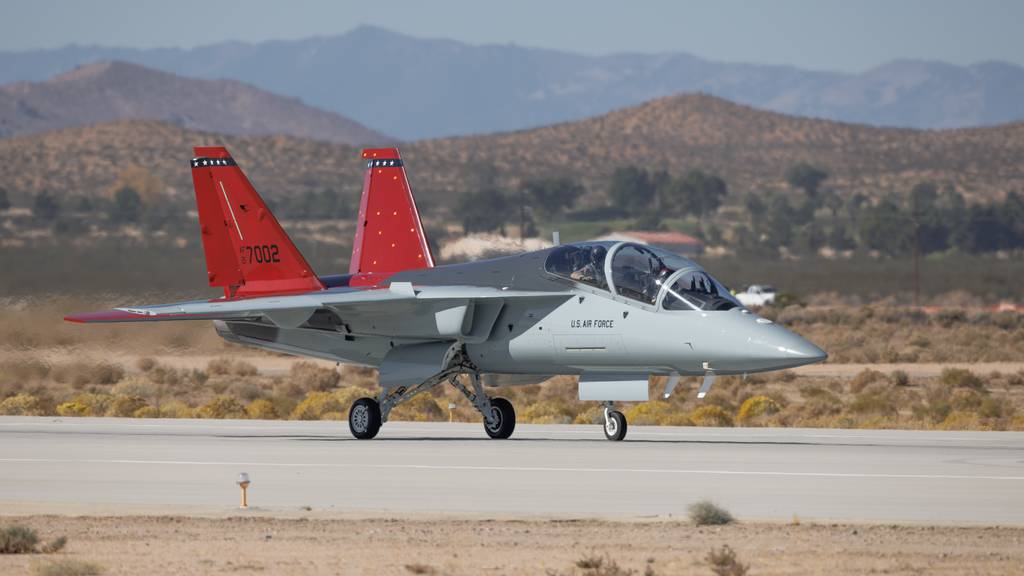
Boeing said Friday that quality problems with parts slated for the T-7A Red Hawk training jet mean it will delay by several months delivering the next test aircraft to the Air Force.
Boeing is also now planning to start low-rate initial production on the T-7 in mid-2024, several months later than the company’s original plan. Boeing vice president and T-7 program manager Evelyn Moore told Defense News Friday that supply chain issues were also why the company will postpone the planned start for its production schedule.
Boeing’s contract with the Air Force requires it to deliver the fourth and fifth engineering and manufacturing development jets in December 2023 and January 2024, Moore said.
However, Moore said, the parts problem now means the fourth jet will probably be delivered later this month, and the fifth jet around March or April.
“We’ve struggled with some part challenges that have caused delays” on those two jets, Moore said. “We’re really focusing on safety and quality, and we are trying to get those jets delivered in the near term.”
The Air Force plans to buy 351 T-7s from Boeing by 2034 to replace its fleet of aging T-38 jet trainers. The T-7 is designed to emulate fifth-generation fighters like the F-35 and make it easier for the service to train new pilots to fly fighters and bombers. The Air Force awarded Boeing a $9.2 billion contract in 2018 to build the T-7 fleet as well as provide simulators and provide other support.
The Air Force told Defense News it did not immediately have a comment on the T-7 delays.
Moore would not detail the type of parts that had problems, but said they were multiple parts of varying sizes from several different suppliers. Boeing had to send some parts back to their original manufacturer for repairs, she said, and already suppliers have started quickly fixing the faulty parts.
The fourth jet now has all of its necessary parts installed, Moore said, and Boeing expects the “handful” of remaining fixed parts for the fifth jet to arrive over the next few weeks.
Moore said Boeing has a quality team working with its suppliers to understand what went wrong with the parts and address the problems.
Boeing is now assembling the new T-7 production line at its St. Louis facility, she added, and expects that to be done by mid-2024. Shortly after that production line is ready, she said, Boeing plans to start assembling LRIP T-7s.
A Government Accountability Office report in May 2023 said Boeing planned to start assembling its first production T-7 in early 2024.
Moore said Boeing could be ready to deliver the first production T-7 in 2025, though she said there is a chance it could be 2026.
Boeing is required to start delivering T-7s 10 months after the Air Force issues an LRIP award, which could come in February 2025. Moore said that by starting production before the LRIP award, the company could deliver jets before its 10-month deadline.
The Air Force expects to make a Milestone C decision on whether to produce the T-7 in February 2025, and for deliveries to start in December 2025. That planned production decision timeline is about two years later than the Air Force originally intended.
GAO raised concerns in its 2023 report about potential increased risk from having the T-7′s development, testing and production phases overlapping. The auditing agency warned this approach can lead to rising costs or schedule delays if problems are found in testing that then must be fixed on the production line.
Moore acknowledged concurrency can be a danger, but noted T-7s have carried out more than 500 flights so far and is about 60% finished with its flight testing process, reducing the risk of overlapping development and production.
“We’ve been flying the T-7 for several years, collecting data [and] integrating that data into new software releases,” Moore said. “It is a risk, but we are managing and mitigating that risk.”
Moore said Defense Contract Management Agency officials are already conducting oversight inspections on components slated for production T-7s.
Boeing delivered the first three of five planned engineering and manufacturing development jets to the Air Force in 2023. One is now undergoing flight testing at Edwards Air Force Base in California; another is expected to wrap up climate testing at Eglin Air Force Base in Florida this month. Boeing delivered the third aircraft in December, and it’s expected to fly to Edwards this month.
The fourth and fifth test jets now in the final phases of construction will stay at Boeing’s facility in St. Louis, Missouri, Moore said, and will be used to check how well maintenance procedures match the instructions laid out in the jet’s technical manuals.
Author: Stephen Losey
Source: DefenseNews



